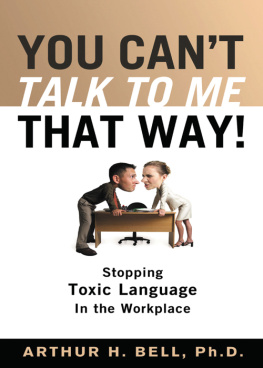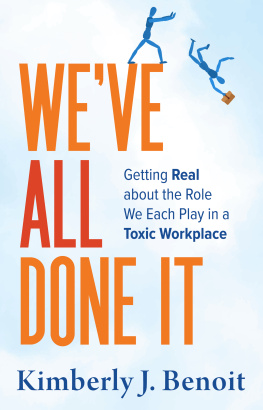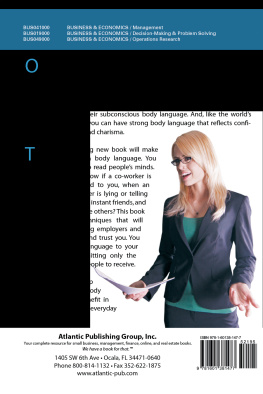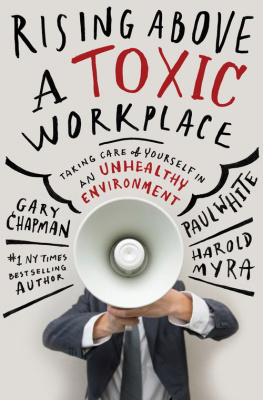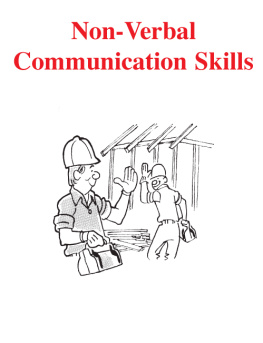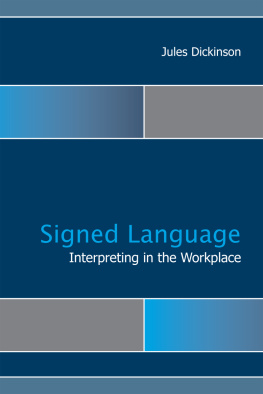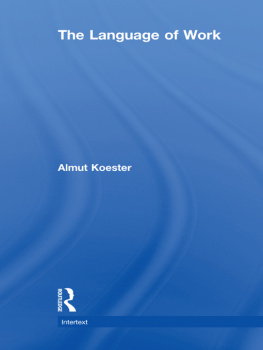Contents

Copyright 2005 by Arthur H. Bell
All rights reserved under the Pan-American and International Copyright Conventions. This book may not be reproduced, in whole or in part, in any form or by any means electronic or mechanical, including photocopying, recording, or by any information storage and retrieval system now known or hereafter invented, without written permission from the publisher, The Career Press.
You Cant Talk to Me That Way!
Edited And Typeset by Christopher Carolei
Cover design by Johnson Design
Printed in the U.S.A. by Book-mart Press
To order this title, please call toll-free 1-800-CAREER-1 (NJ and Canada: 201-848-0310) to order using VISA or MasterCard, or for further information on books from Career Press.

The Career Press, Inc., 3 Tice Road, PO Box 687,
Franklin Lakes, NJ 07417
www.careerpress.com
Library of Congress Cataloging-in-Publication Data
Bell, Arthur H. (Arthur Henry), 1946
You cant talk to me that way! : stopping toxic language in the workplace / by Arthur H. Bell.
p. cm.
Includes bibliographical references (p.) and index.
ISBN 1-56414-822-X (paper)
eISBN : 9781601637840
1. Bullying in the workplace. 2. Language in the workplace. 3. Verbal self-defense. 4. Invective. I. Title.
HF5549.5.E43B45 2005
650.13--dc22
2005042168
www.redwheelweiser.com
www.redwheelweiser.com/newsletter
To my son Arthur James Bell, with congratulations on his completion of the Ph.D. in Linguistics at Cornell University and his new career at the State Department. Our occasional approaches to verbal conflict over the years almost always ended in laughter.
Research interest in verbal abuse in the workplace is in its infancy, with far less investigative or analytic work in its corner than has been done for allied problems such as sexual harassment/abuse and physical violence at work.
With recognition to those who have begun such research, my first debt of gratitude goes to the front line of more than one hundred executives, managers, supervisors, and rank and file employees who let me in to the sometimes embarrassing, sometimes frightening, and always fascinating world of their own experiences with (and observations of) verbal abuse over the course of their careers.
In particular, I want to thank leaders at Charles Schwab, Price Waterhouse Coopers, PaineWebber, the U.S. Navy, Cisco Systems, Oracle, TRW, Johnson & Johnson, Cost Plus World Market, American Stores, Artex Knitting Mills, the U.S. State Department, Apple Computer, Sun Microsystems, British Telecom, Deutsche Telekom, Santa Fe Railway, Global Technologies, Wells Fargo, the U.S. Coast Guard, Lockheed Martin, and many other companies and organizations small and large. All demonstrate a deep commitment to workplace values and employee relations that leave no room for verbal abuse.
I also thank my colleagues at the University of Southern California, Harvard University, the Naval Postgraduate School, Georgetown University, the University of San Francisco, and elsewhere, for the conversations and contacts that helped shape this book. And once again, for the third time, I express my admiration and gratitude to my editors and production experts at Career Press, most notably Michael Pye, Kirsten Dalley, Christopher Carolei, and Linda Rienecker. Through their tact and patience, we all managed to avoid verbal conflict in the process of producing a book about it.
Finally, I want to thank my friend and agent Grace Freedson for her faith in this project and her hard work on my behalf.
The importance of this book lies in its expert, practical advice on what to do about an extremely serious problem in business, government, the military, and other organizations. Abusive language between bosses and subordinates, or between peers, has the immediate result of spoiling relationships (and productivity based on such relationships), and the long-term effect of ruining morale, teamwork, and loyalty.
The plain fact, as Art Bell argues eloquently, is that you cant talk to me like that without consequences of some kind. In some situations, the victim of abusive language snaps back, causing an emotional dustup that occupies the attention and energy of the office for hours or days at a time. (Scars from the more spectacular verbal blowups can last for years in some companies.) At other times, the victim clams up and refuses to do his or her best work, or any work at all, after experiencing verbal stings. Perhaps most devastating of all to the workplace is the effect of the rumor mill, which divides workers into armed camps depending upon whose side of the argument they favor. Multimillion dollar projects have come late to market, or have fallen through entirely, based solely on the fact that workers couldnt get along.
Much of management research in the last few decades has been devoted to discovering and understanding the something else beyond financial incentives that keep employees striving to do their best. Art Bell has broken new ground here by surfacing a well-known but little discussed antagonist to business processes and employee motivation. His definition of abusive language, his rationale for why it occurs, and his remedies for resolving and preventing it all have the potential to set dysfunctional organizations back on a productive track. The success of most business ventures, after all, depends upon smooth, reliable, and respectful interactions between people. When these bonds break down due to abusive language, the gears of business and industry no longer mesh. Client relationships, business promises, and corporate goals all come crashing to a halt.
Just as valuable as this books advice to individuals is its program for corporate policies and procedures. Tolerance for abusive language within an organization is a cultural issue, not unlike a companys attitudes and rules regarding sexual harassment, racial discrimination, or age bias. Art Bell shows, with actual training syllabi and sample policy statements, how companies can take a stand against abusive language at all levels within the organization. The fruit of such action, of course, lies not only in its essential morality but also in the very real benefits it pays to the company and its employees. A workforce that does not have to cower in the face of a bosss withering verbal attacks experiences less stress, takes fewer sick days, engages in less litigation over a hostile work environment, and tends to give more effort and exhibit more creativity. Companies are the beneficiaries, in terms of profits, innovation, and employee loyalty, of these feelings of mutual respect and workplace safety.
Few of us have not had occasion to spout off with a blast of colorful language at some point. But Art Bell points out that the business environment is not the place for those verbal eruptions. From legal, strategic, and human relations perspectives, the costs of abusive language in the workplace are far too great compared to any temporary boost such verbal attacks might achieve in building a fire under someone. The beauty of this book is that is takes us from what should happen in organizations to practical ways in which they can happen.
Read this book and take it to heart if you play a leadership role in any kind of organization. Just as important, provide the book to your employees as a highly readable, sensible guide to their use of language in the workplace.
Thomas J. Housel, Ph.D.
Next page
